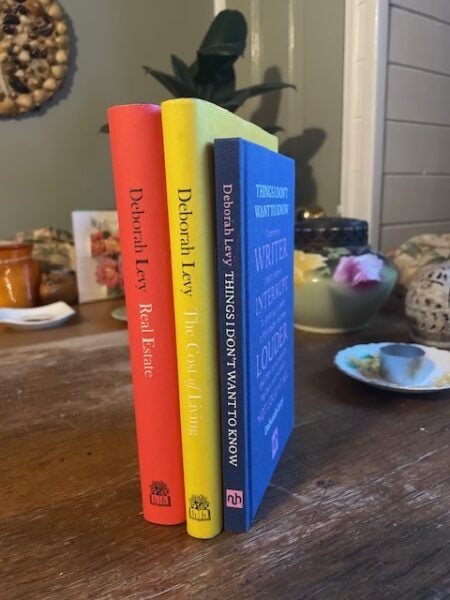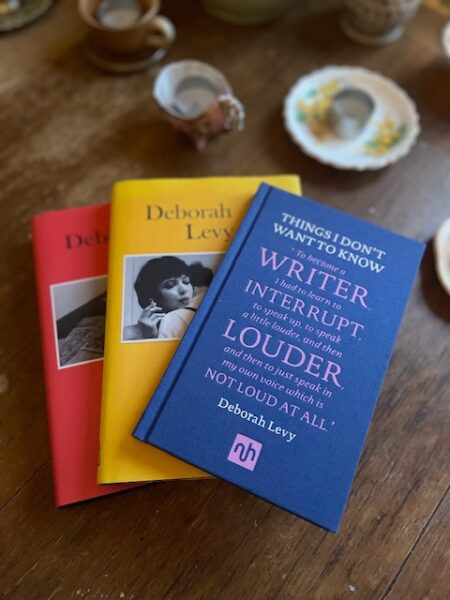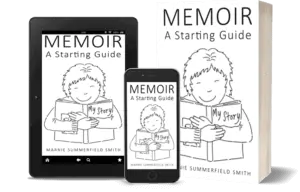
On Saturday, October 21st, I attended the Margate Bookie Literary Festival to hear Deborah Levy talk about her latest novel August Blue. I absolutely love Levy’s memoir triptych, her living autobiography series which consists of:
Kate Kellaway says in her review of The Cost of Living, in which Levy has to rent a shed in which to write, “What is wonderful about this short, sensual, embattled memoir is that it is not only about the painful landmarks in her life – the end of a marriage, the death of a mother – it is about what it is to be alive. I can’t think of any writer aside from Virginia Woolf (or, perhaps, Helen Simpson) who writes better about the liminal, the domestic, the non-event, and what it is to be a woman. I always feel, reading Levy (this is her second memoir), that she is a writer with nothing much – and with everything – to say.”
Levy’s writing is sparse, illuminating and totally glorious. I’m always banging on to my writers about how being observant is the most important skill they can have, and Levy is one of the best. When I finished reading her memoirs for the second time (I’ll be going for a third round shortly), sad that the experience was over, I tried her novels. I got frustrated, as I often do with novels, that they weren’t true, and didn’t finish them. But when a memoirist I admire recommended August Blue, I went for it. It is an intriguing novel, beautifully written of course. Hearing Levy read parts aloud – she has an electrifying reading voice, slow and sensual – made me want to read it again with her voice in my head. It may not be a memoir, but of course it has a resonant emotional truth to it and a feminist spine, as Levy put it. Or she may have said feminist backbone. As does all Levy’s work.
I frantically took notes as Levy spoke about the novel and her work more widely. I hope I have them correct. She told us, “A writer is both a mole, digging deep into reality, and an eagle, soaring above it. For me, that’s the pleasure of writing.”
I found this fascinating as it’s so apparent in Levy’s work. She is curious. And she paying close attention to everything. Paying attention is an art and it’s something I speak about with my authors a lot. In memoir you have the close up, the writing where you are the main character – the scenes, brought to life with remarkable detail – hopefully. Then you have the bigger picture – the wide or long shot. This is where you reflect, showing your perspective, writing as narrator, using your time-of-writing voice. The observation of the self, so much self-awareness, is what’s required here.
Levy spoke about when she was seven years old and didn’t speak much and how, this struggle to find language, is connected to her writing. It’s something she writes about in her living autobiographies. One of her recurring themes, she said, is, “the pain of expression. It’s not the most articulate person in the room who interests me.”
She spoke about, “words being smaller than emotions.”
Deborah Levy is a serious writer and a serious woman, and it was wonderful to hear her speak and see how light-hearted she is too. She spoke about how she begins her books (I don’t know if she meant her memoirs too), saying that her opening chapters can take up to eight months to write. Eight months! To set the mood for the whole book, she said. “I always think it will get easier, but it doesn’t. It’s the scaffolding. I think I know how my books will end but my books tell me different. My books are smarter than me.”

She went on to say, “I like to create an intense mood. My way to do that is with the accumulation of light, flat sentences with a real pull. Surface and depth.”
I could have listened to Deborah Levy talk all day, but sadly the wonderful event was over too soon. I was grateful to have been there and learned so much. I am so thankful to the wonderful literary festivals near my home in east Kent that give us the opportunity to gain wisdom on the craft directly from renowned voices like Levy.
I of course queued up afterwards and asked her to sign my copy of The Cost Of Living – I’d read August Blue on Kindle. I thanked her for her wonderful work and asked her if she would please write more living autobiographies. I sort of begged her actually and told her that we (me and my best mate JRo who’d come with me, plus the rest of womankind) needed them. I was trying to pay her a compliment, but she looked at me as if to say, isn’t three enough? Maybe I mis-read her, but I felt bad for asking. It is a lot to ask of someone: “Could you please go through some difficult experiences, then excavate your soul and pour yourself mind and body, onto the page in the most extraordinary prose possible – for my education and pleasure – again?”
I told her that I constantly recommend her books to my students and buy them for my women friends as gifts.
And as I walked away, she told me, “Thank you for teaching memoir.”
I love my work and my authors, so I was very moved by her words. I wanted to shout to the world, “Deborah Levy thinks what you’re doing is important – she wants you to write your memoirs!” So, that’s what I’m doing, here.
I hope you’ll take her words to heart, “A writer is both a mole, digging deep into reality, and an eagle, soaring above it.”
Wonderful – especially the last part, “For me, that’s the pleasure of writing.” Because there is so much pleasure in the process of writing about ourselves – I see it up close, all the time.
I’d taken my share of Deborah Levy’s time, so I thanked her again and walked away.
I had a bit of post-conversation-fan-meets-hero anxiety for a moment after the author signing and wished that as I’d walked away, I’d called over my shoulder, “And thanks again Deborah. Three is more than enough.”
